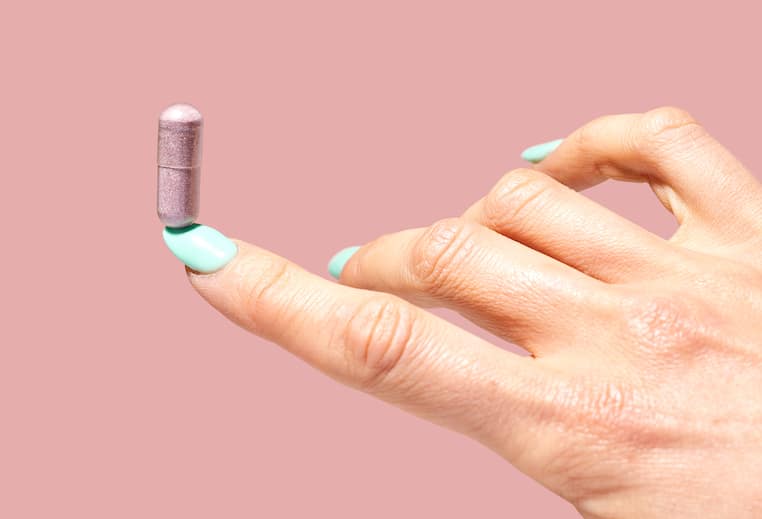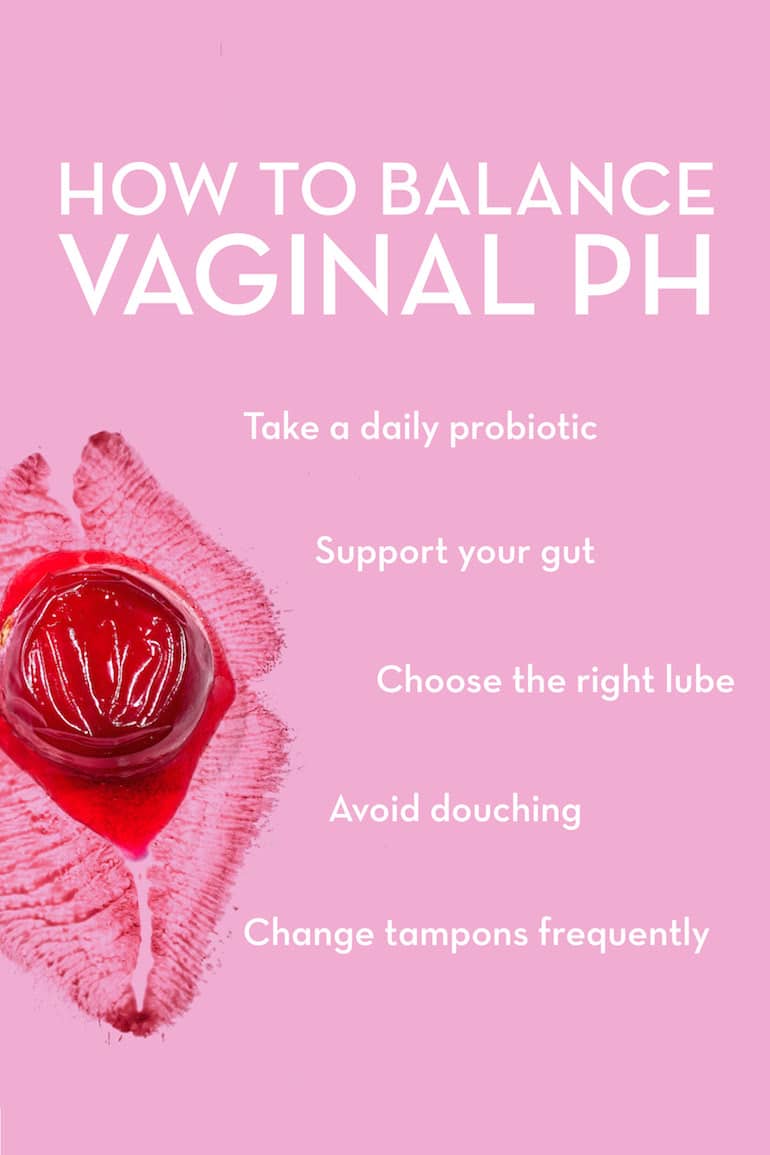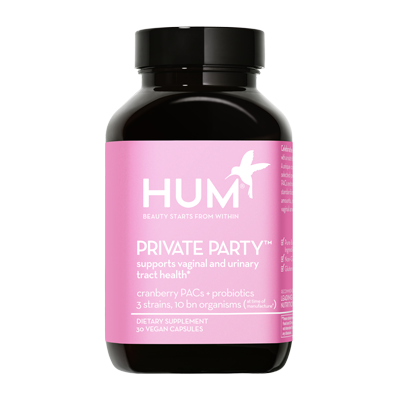Let’s be honest: You probably don’t pay too much attention to your vaginal health unless things are painful, itchy, smelly, or otherwise uncomfortable. But when things do go wrong down below, it often involves an all-encompassing unpleasantness that you’d do anything to fix.
In large part, the health of your vaginal tissue comes down to vaginal pH—a measure of its relative acidity or alkalinity. The good news: There are specific ways you can maintain a healthy vaginal pH, which, in turn, can prevent infections, vaginal odors, and more.
Below, we’ll dive into what constitutes a healthy vaginal pH, what can mess with it, and how to bring it back into balance.
Why vaginal pH balance matters
The term pH refers to how acidic or basic (alkaline) something is, and the pH scale runs from 0 to 14. A pH below 7 is considered acidic, while a pH above 7 is considered basic. So what’s a healthy vaginal pH? While you might assume neutral, you actually want things slightly acidic.
“A normal vaginal pH is 3.8 to 4.5, which inhibits the growth of inappropriate bacteria,” says Wendie Trubow, MD, MBA, a functional medicine gynecologist at Five Journeys. “When the pH is higher and gets into alkaline range, then undesirable bacteria can grow, sometimes leading to bacterial vaginosis (BV)—an imbalance caused by an overgrowth of Gardnerella vaginalis, which can cause itching, burning, and an unpleasant odor.” Additionally, BV often involves a gray, yellow, or white vaginal discharge with a foul, fishy odor.

Bacterial vaginosis (BV) is also characterized by a deficit of healthy vaginal Lactobacillus bacteria. The Lactobacillus species is incredibly important, as these beneficial bacteria secrete lactic acid, which creates an acidic vaginal pH. That inhibits the growth of pathogenic bacteria in the vagina. So, when not enough of these “good guys” are present, bad bacteria can proliferate. (Similar to what happens in your gut microbiome.)
While BV isn’t all that harmful by itself, research shows that it can increase the risk of contracting a variety of sexually transmitted diseases such as human papillomavirus (HPV), herpes simplex virus 2, gonorrhea, trichomoniasis, and HIV. Why, exactly? High vaginal pH is associated with a greater number of inflammatory compounds called cervicovaginal inflammatory cytokines, which have been implicated in increased vulnerability to STDs, as well as greater risk of preterm labor if you’re pregnant.
What alters vaginal pH
A variety of factors can raise vaginal pH to unhealthy levels, including anything that suppresses the growth of good Lactobacillus bacteria. Here are some of the top offenders:

Douching
About 1 in 5 women regularly douche, even though doctors recommend not to. Douching involves using a nozzle to wash the inside of the vagina with a combination of fluids including water and vinegar, baking soda, or iodine. However, the vagina is self-cleaning, so this is completely unnecessary. Not only is douching not needed, but it can alter the delicate balance of good and harmful vaginal bacteria that is necessary to maintain an acidic environment. This, in turn, can prime you for infections.
Menstruation
Because blood is normally slightly basic, menstruation can temporarily raise the pH of the vagina. Often, this doesn’t cause any issues, but when menstrual blood hangs around too long—say, if you don’t change your tampon frequently enough—pH remains elevated for longer, which may contribute to problems.
Unprotected sex
Ejaculation of semen into the vagina can play a role in elevating vaginal pH, because semen is slightly alkaline. Again, there’s nothing wrong with this, but it’s another thing to note that may make you want to pay more attention to your vaginal health. (Oral sex would not have the same impact.)
Poor gut health
In Dr. Trubow’s practice, recurrent BV often relates back to the health of the gut microbiome. This is because the gut and vaginal microbiomes are closely connected, and the bacteria and other microbes in the gut can influence the composition of microbes in the vagina. Everything from an overly processed diet to excessive stress to antibiotic use can negatively impact the gut.
Antibiotics
While you should never skip antibiotics when your doctor prescribes them for a specific condition, it’s important to know that these drugs not only kill pathogenic bacteria, but also the good bacteria necessary to maintain a healthy vaginal pH.
How to balance vaginal pH

While your unique biology may potentially prime you for an imbalanced vaginal pH, there are a number of ways to get your levels back in check and prevent unpleasant issues. “The vagina is a really cool ecosystem and it responds well to a number of interventions,” says Dr. Trubow. Here are some ways you can tackle the issues outlined above:
- Avoid intravaginal douching. Instead, simply wash the outside of your vagina with warm water and a bit of mild, unscented soap.
- Change tampons frequently. Every 4-6 hours is recommended, or more frequently depending on your flow. You can also consider using pads or a menstrual cup instead.
- Use a condom during sex. Or have your partner pull out prior to ejaculation. While the pull-out method will not necessarily prevent pregnancy, it prevents alkaline semen from hanging around in the vagina and elevating pH. (Of course, this is completely up to your personal preference, but important to consider if you have frequent infections.)
- Choose the right lube. If you use lube, avoid scented/flavored lubes, and lubricants containing glycerin or glycerol, which have proven to be irritating and may alter vaginal microbiota, impacting vaginal pH over time. Instead, look for an unscented water-based or silicone-based lube. Some even state that they’re pH balanced.
- Avoid unnecessary antibiotic use. Only take this type of medication as directed by your doctor, and consider taking a probiotic supplement a few hours after or before your antibiotic dose or eating fermented foods to help repopulate your body with good bacteria (more on the specific strains of beneficial probiotic bacteria below).
- Support your gut with a nutrient-dense diet. “If the vagina is not in balance, look to the gut to balance it out,” says Dr. Trubow. “Focus on the elimination of processed foods, sugar, and alcohol and increase rest.” Then, add in more nutrient-dense fare such as vegetables, fruits, whole grains, nuts, seeds, anti-inflammatory oils such as olive oil, and high-quality fish and meat.
- Take a daily probiotic supplement. Probiotics can support a healthy gut microbiome, which in turn helps support the type of healthy vaginal microbiome that’s crucial for maintaining a healthy, acidic pH. Specifically, supplements containing Lactobacillus strains of probiotic bacteria (e.g. Lactobacillus acidophilus, Lactobacillus rhamnosus, Lactobacillus reuteri) appear to be particularly beneficial for vaginal health. Research shows that these beneficial Lactobacillus microbes can disrupt BV and yeast biofilms and inhibit the growth of urogenital pathogens.
So, while an imbalanced vaginal pH can lead to seriously unpleasant consequences, there are a number of simple changes you can make to your personal hygiene practices, your diet, your sex life, and your supplement routine to keep vaginal pH a healthy acidic range. And while sometimes prescription medication will be necessary to tackle a particularly persistent case of BV, only a healthy overall lifestyle will help keep your pH levels in check so you can prevent a future bout of BV altogether and reduce your risk of all its associated complications.









